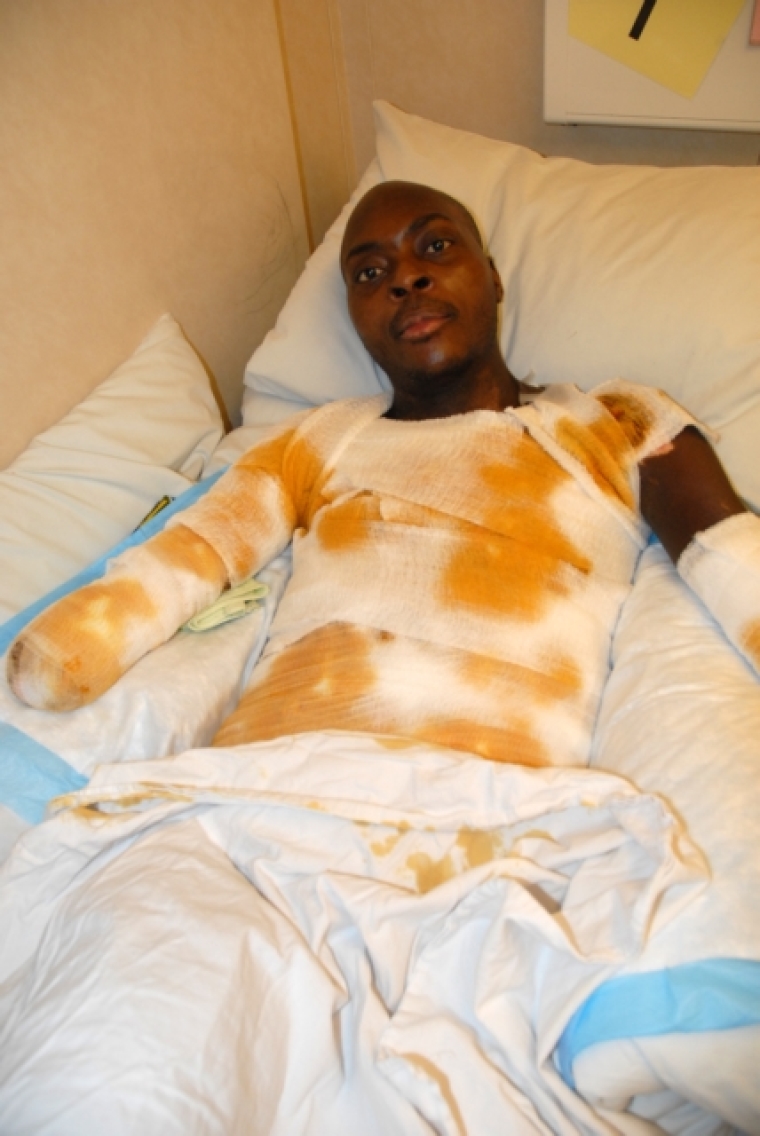
This story is a testimony to that ideal.
|PIC1|Recently, a patient named Ganiyou was admitted to the hospital onboard the Africa Mercy. A year ago, he sustained severe burns to his arms and torso after accidentally electrocuting himself on a live wire. The damage was so brutal that he had to have both his arms amputated in order to save his life. Ganiyou was treated in several hospitals in Benin, but the medical care was not sufficient. After 12 months his burns had still not healed.
Ganiyou came to the Africa Mercy where he was assessed by Dr. Tertius Venter, a South African plastics surgeon who annually serves with Mercy Ships for weeks at a time. Dr. Venter determined that the infection in his burns would need to be treated before surgery could be attempted to apply skin grafts. Ganiyou was handed over to the full-time care of the nursing staff.
A daily routine of dressing his infected burns began. The process of removing old dressings, washing him under a shower, and the application of anti-biotic cream and fresh dressings took up to 2 hours at a time. Initially it was an excruciatingly painful procedure for Ganiyou to endure. He would scream in anguish. For both him and the nurses it was a traumatic and emotional experience.
Weeks passed and the dressing changes gradually became less painful. Eventually Ganiyou no longer required pain medication. It became evident that the burns were healing.
"I am surprised at how quickly I am healing here. My chest is almost completely healed," said Ganiyou. "For over a year at the other hospitals my chest did not heal. They used everything, but here for some reason it works. I think it is because I am smiling more and I am happy here," he concluded.
After 6 weeks of daily dressing changes, Ganiyou was reassessed by Dr. Venter. The prognosis was extremely positive. The infection was gone and the burns had healed so well that Ganiyou required no skin graft surgery. Another encouraging outcome was that no burn contractures had developed – a restrictive tightening of the skin which often occurs as a burn heals.
Every nurse onboard the ship has had some contact with Ganiyou. Many of them took turns changing his dressings and have come to know him as a friend. Ganiyou's successful recovery was due entirely to the determined, loving care of the nurses onboard the Africa Mercy.
The results are not only a testament of the professional abilities of the nurses, but also their vibrant, kind, and loving personalities which create a pleasant and uplifting environment on the wards of the Africa Mercy. Interaction with the patients is as important to their recovery as administering medical treatment. Nurses often spend time with the patients playing games, building puzzles, reading books, singing songs and talking.
It is a hospital like no other in the world, with an entirely different set of challenges. All nurses work as volunteers onboard the Africa Mercy and the duration of service varies for each individual. There are currently 11 different countries represented among the nurses, with as many languages between them. Nurses pray together at the start and end of every shift. So too, they not only provide physical care for the patients but also offer spiritual counselling and prayer.
It is estimated that more than 5000 patients will be treated onboard the Africa Mercy this year. All of these patients will receive some form of treatment from the nurses onboard and they will undoubtedly all experience the love and joy that they bring.
A case like Ganiyou's illustrates that the world's largest non-governmental hospital ship can make a significant, positive difference in the lives of the sick and suffering. This is in part thanks to the selfless service of the nurses, who without, Mercy Ships would be unable to bring hope and healing to the world's forgotten poor. www.mercyships.org.au